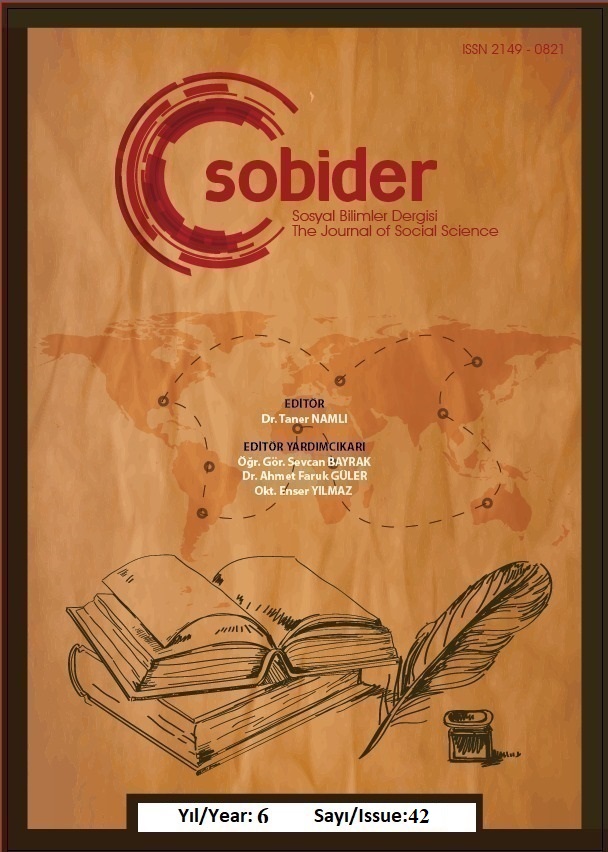Author :
Abstract
Tanzimat’ın ilanıyla birlikte siyasi, sosyal, kültürel ve ekonomik alanlarda Batı etkisinin belirginleşmesi edebî sahada da yankısını bulur. Batılılaşma düşüncesinin sosyo-kültürel alandaki yansımaları, özellikle sosyal fayda prensibi ile hareket eden dönem sanatçılarını harekete geçirir. Çünkü bu dönem sanatçıları, Batılılaşma fikriyle başlayan değişim hareketlerinin temelinde eğitimi bir sorun olarak ele almak gerektiğine inanırlar. Düşüncelerini geniş kitlelere ulaştırmak amacıyla farklı yazı ve yayın türleri kullanan sanatçılar, roman türündeki eserlerinde de amaçlarına uygun hareket ederler. Dönem aydınlarının eğitim ile ilgili önemsedikleri bir başka unsur da okul (mektep)dışında verilen eğitimin içeriği ve niteliğidir. Bu açıdan çalışmada, Tanzimat dönemi romanlarından hareketle eğitim ve öğretimin kurumsal olmayan boyutu değerlendirilecektir.
Keywords
Abstract
With the declaration of the political reforms (Tanzimat) in Ottoman State in 1839, the Western effect became evident in political, social, cultural and economic aspects, and they also had their reflections within literature. The socio-cultural reflections of Westernization ideology motivated especially the artists of the era who followed social benefits basis. Because, the artists of the era thought that education, which was a base to the movements of change triggered by ideology of Westernization, should be regarded as a basic problem. With the purpose of spreading their ideas to bigger audience, the authors who utilized a variety of ways of writing and publishing, used the novel in accordance with their purposes. The other education wise aspect that the intellectuals of the era paid attention to was the content and quality of the non-institutional education. With respect to the Tanzimat era novel, non-institutional extent of the education will be analyzed within this study.
Keywords
- Ahmet Mithat Efendi (2000); Hasan Mellâh yahut Sır İçinde Esrar, (Haz. Ali Şükrü Çoruk), Ankara: Türk Dil Kurumu Yay.
- __________________ (2000); Zeyl-i Hasan Mellâh yahud Sır İçinde Esrar, (Haz. Ali Şükrü Çoruk), Ankara: Türk Dil Kurumu Yay.
- __________________ (2000); Karnaval, (Haz. Kazım Yetiş), Ankara: Türk Dil Kurumu Yay.
- __________________ (2000); Felâtun Bey ile Râkım Efendi, (Haz. Kâzım Yetiş, Necat Birinci- M. Fatih Andı), Ankara: Türk Dil Kurumu Yay.
- __________________ (2000); Yeryüzünde Bir Melek, (Haz. Nuri Sağlam), Ankara: Türk Dil Kurumu Yay.
- __________________(2000); Acâyib-i Âlem, (Haz. Nuri Sağlam-Kâzım Yetiş-M. Fatih Andı),
- __________________ (2000); Vah, (Haz. Kâzım Yetiş), Ankara: Türk Dil Kurumu Yay.
- __________________ (2000); Esrâr-ı Cinayât, (Haz. Nuri Sağlam-Ali Şükrü Çoruk), Ankara: Türk Dil Kurumu Yay.
- __________________ (2000); Müşahedat, (Haz. Necat Birinci), Ankara: Türk Dil Kurumu Yay.
- __________________ (2000); Taaffüf, (Haz. Necat Birinci-Ali Şükrü Çoruk-Erol Ülgen),
- __________________ (2000); Kafkas, (Haz. Erol Ülgen-Fatih Andı), Ankara: Türk Dil Kurumu
- __________________ (2002); Demir Bey Yahut İnkişâf-ı Esrâr, (Haz. Nuri Sağlam-M. Fatih Andı), Ankara: Türk Dil Kurumu Yay.
- __________________ (2003); Gürcü Kızı yahut İntikam, (Haz. Erol Ülgen-Fatih Andı-Kâzım Yetiş), Ankara: Türk Dil Kurumu Yay.
- __________________ (2003); Mesâil-i Muğlâka, (Haz. Ali Şükrü Çoruk-M. Fatih Andı-Kâzım
- __________________ (2003); Jön Türk, (Haz. Ali Şükrü Çoruk-M. Fatih Andı-Kâzım Yetiş),
- Cebeci, Dilâver (2009); Tanzimat ve Türk Ailesi-Sosyal Değişme Açısından Tanzimat İstanbul’unda Türk Ailesi Üzerine Bir İnceleme, İstanbul: Bilge Oğuz Yay.
- Fatma Aliye Hanım (2012); Udi, (Haz. Şahika Karaca), İstanbul: Kesit Yay.
- _________________ (2012); Enîn, (Haz. Ayşe Demir), İstanbul: Kesit Yay.
- _________________ (2014); Muhadarat, (Haz. Fazıl Gökçek), İstanbul: Özgür Yay.
- Recaizâde Mahmut Ekrem (2014); Araba Sevdası, (Haz. Hüseyin Alacatlı), Ankara: Akçağ
- Şemsettin Sami (2014); Taaşşuk-ı Tâl’at ve Fitnat, (Haz. Yakup Çelik), Ankara: Akçağ Yay.
- Timur, Taner (2002); Osmanlı-Türk Romanında Tarih, Toplum ve Kimlik, Ankara: İmge Kitabevi Yay.
- Tüzer, İbrahim (2014); Ahmet Mithat Anlatılarında Kimlik İnşası ve Modernizm, Ankara: Akçağ Yay.
- Yıldız, İpek (2018); Tanzimat Romanında Eğitim Sorunu, Fırat Üniversitesi Sosyal Bilimler Enstitüsü, Türk Dili ve Edebiyatı ABD, Yayınlanmamış Doktora Tezi, Elazığ.





